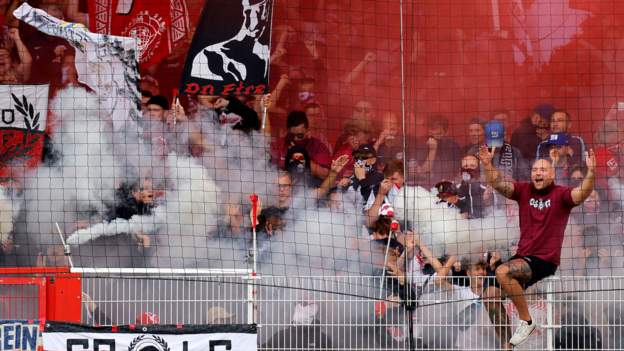“Unbelievable – it’s like something out of a fairy tale,” exclaims Jon Darch, a devoted Union Berlin fan. In just five short years, Union Berlin has embarked on one of the most remarkable journeys in European football, culminating in their debut in the Champions League against none other than Real Madrid at the iconic Bernabeu stadium.
It’s a story that begins in the humble environs of the second tier of German football. Five years ago, Union Berlin was plying their trade there. Fast forward to today, and they’re rubbing shoulders with the elite of European football.
This ascent has been achieved without the backing of wealthy benefactors or household-name players. Union Berlin is a club owned by its passionate fan base, with over 40,000 members having a say in critical decisions like appointing the CEO and board members.
Mark Wilson, the man behind Union In Englisch, a blog and podcast for English-speaking fans, notes that Union Berlin’s success is a testament to a traditional path to success, one that doesn’t solely rely on financial muscle. “We are not a cult club – just a club which has entrenched itself in its community,” he says.
Much of the credit for Union’s meteoric rise goes to the Swiss manager Urs Fischer and managing director Oliver Ruhnert. Both have been at the helm since 2018, overseeing the club’s transformation. Their meticulous squad planning, identifying talent, and developing players have been instrumental in Union’s success.
On the pitch, Union Berlin’s style has been dubbed “terror football from Kopenick” by Bas Timmers, author of ‘Abnormally Ordinary – A Dutchman explains Union Berlin.’ It’s a pragmatic, well-executed counter-attacking approach that has left opponents struggling to find answers.
However, not all fans have greeted Union’s Champions League adventure with open arms, especially given the change in venue. Union’s home, the Stadion An der Alten Forsterei, is renowned for its intimate atmosphere, with only 3,000 seats. Still, for their Champions League campaign, the club opted for the larger Olympiastadion, home to Hertha Berlin, to accommodate more fans and increase revenue.
While this move makes commercial sense, it has raised concerns among some purists. Timmers expresses mixed feelings, stating, “The Olympic stadium is not home.”
The evolution of Union Berlin continues in their summer transfer strategy, as they prepare for Champions League football. Instead of unearthing hidden gems, they’ve made high-profile signings like Leonardo Bonucci, a European and world champion. This move signals Union’s ambition and desire to compete at the highest level.
The question arises: Will Union Berlin lose its unique identity as success keeps rolling in? Wilson believes otherwise, emphasizing the sense of community that defines the club. “At Union, you get this real sense of community. You know the members, the people involved; it gets to you.”
In the Champions League, Union Berlin finds itself in a tough group alongside Real Madrid, Napoli, and Braga. Expectations vary, with some fans hoping for a respectable third-place finish and a drop into the Europa League, while others are looking forward to the adventure and the experience of supporting their team on the biggest stage.
Whatever the outcome, one thing remains clear: Union Berlin’s extraordinary journey from the second tier to the Champions League exemplifies the power of community, passion, and a well-executed footballing vision.
Frequently Asked Questions (FAQs) about Union Berlin’s Rise
Q: How did Union Berlin achieve such a remarkable rise in European football?
A: Union Berlin’s ascent in European football is a result of strategic planning, fan ownership, and a dedicated management team. Swiss manager Urs Fischer and managing director Oliver Ruhnert have been pivotal in identifying and developing talent. The club’s fan-owned structure, with over 40,000 members, ensures a strong community bond.
Q: What is Union Berlin’s playing style?
A: Union Berlin is known for their pragmatic, counter-attacking style of play, often referred to as “terror football from Kopenick.” It’s a well-executed approach that emphasizes efficiency and hard-to-beat football.
Q: Why did Union Berlin choose to play their Champions League games at the Olympiastadion instead of their home stadium?
A: While Union’s home stadium, Stadion An der Alten Forsterei, has an intimate atmosphere, it has limited seating. To accommodate more fans and increase revenue for their Champions League campaign, the club opted for the larger Olympiastadion, home to Hertha Berlin.
Q: Is there a concern that Union Berlin might lose its unique identity as it achieves more success?
A: Union Berlin fans have had concerns about maintaining the club’s identity. However, many believe that the sense of community and fan involvement will remain intact despite the club’s rise in European football.
Q: What are Union Berlin’s expectations in the Champions League?
A: Expectations vary among fans, with some hoping for a third-place finish and a drop into the Europa League. Others are looking forward to the adventure and experience of supporting their team on the biggest stage. Regardless, staying true to their ethos is a priority.
